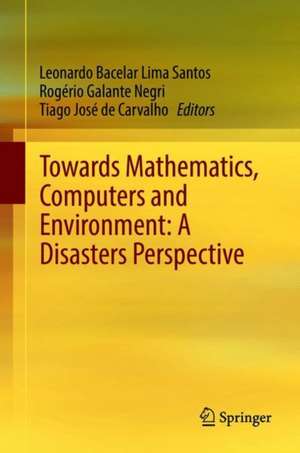Towards Mathematics, Computers and Environment: A Disasters Perspective
Editat de Leonardo Bacelar Lima Santos, Rogério Galante Negri, Tiago José de Carvalhoen Limba Engleză Hardback – 5 aug 2019
With relevant, timely topics, this book gathers carefully selected, peer-reviewed scientific works and offers a glimpse of the state-of-the-art in disaster prevention research, with an emphasis on challenges in Latin America. Topics include studies on surface frost, an extreme meteorological event that occasionally affects parts of Argentina, Bolivia, Peru, and southern Brazil, with serious impacts on local economies; near-ground pollution concentration, which affects many industrial, overpopulated cities within Latin America; disaster risk reduction and management, which are represented by mathematical models designed to assess the potential impact of failures in complex networks; and the intricate dynamics of international armed conflicts, which can be modeled with the help of stochastic theory. The book offers a valuable resource for professors, researchers, and students from both mathematical and environmental sciences, civil defense coordinators, policymakers, and stakeholders.
| Toate formatele și edițiile | Preț | Express |
|---|---|---|
| Paperback (1) | 639.59 lei 43-57 zile | |
| Springer International Publishing – 14 aug 2020 | 639.59 lei 43-57 zile | |
| Hardback (1) | 645.79 lei 43-57 zile | |
| Springer International Publishing – 5 aug 2019 | 645.79 lei 43-57 zile |
Preț: 645.79 lei
Preț vechi: 759.76 lei
-15% Nou
Puncte Express: 969
Preț estimativ în valută:
123.61€ • 134.31$ • 103.90£
123.61€ • 134.31$ • 103.90£
Carte tipărită la comandă
Livrare economică 21 aprilie-05 mai
Preluare comenzi: 021 569.72.76
Specificații
ISBN-13: 9783030212049
ISBN-10: 3030212041
Pagini: 272
Ilustrații: XIX, 258 p. 74 illus., 61 illus. in color.
Dimensiuni: 155 x 235 mm
Greutate: 0.57 kg
Ediția:1st ed. 2019
Editura: Springer International Publishing
Colecția Springer
Locul publicării:Cham, Switzerland
ISBN-10: 3030212041
Pagini: 272
Ilustrații: XIX, 258 p. 74 illus., 61 illus. in color.
Dimensiuni: 155 x 235 mm
Greutate: 0.57 kg
Ediția:1st ed. 2019
Editura: Springer International Publishing
Colecția Springer
Locul publicării:Cham, Switzerland
Cuprins
Preface.- Numerical atmospheric modelling.- An overview of the El Niño, La Niña and the Southern Oscillation phenomena: theory, observations and modeling links.- Mathematical homogenization and integral transform-based multilayer methods.- The earthquake's mathematics.- Waves propagation and flood by tsunami.- From complex systems theory to disasters risk reduction management.- Bayesian analysis for natural threats and hazards.- Time series analysis applied to disaster risk reduction data.- Data mining approaches to the real-time monitoring and early warning of convective weather using lightning data.- Detection of forest burn stages using remote sensing Images and stochastic distances.- Digital humanities and big microdata: new approaches for demographic research.- Modelling and predicting social and geopolitical disasters as extreme events: A case study considering the dynamics of international armed conflicts.
Recenzii
“The book provides a good selection of valuable papers in the area of environmental research. The main research methods used to study complex and multiscale systems are clearly presented. The target audience includes students of sustainable development, researchers, and even science enthusiasts.” (Alexander Tzanov, Computing Reviews, February 16, 2021)
Notă biografică
Leonardo B. L. Santos is an adjunct researcher at the National Center for Early Warning of Natural Disasters (Cemaden), Brazil. He holds a PhD in Computing from the National Institute of Space Research (INPE, 2014) and a Bachelor’s degree in Physics from the Federal University of Bahia (UFBA, 2009). He received an honorable mention for a talk at the Institute for Pure and Applied Mathematics (IMPA, 2008) and twice as supervisor of best research (INPE, 2015 and 2016), having published more than 25 papers in journals and book chapters. He is the principal investigator of the Brazilian Society of Computational and Applied Mathematics (SBMAC) research group “Mathematics and Natural Disasters.”
Rogério G. Negri completed his Major’s degree in Mathematics (2006) at the São Paulo State University (UNESP), and his Master (2009) and PhD(2013) in Applied Computation at the Brazilian National Institute for Space Research (INPE), Brazil. He has experience in pattern recognition, radar image processing, geostatistics, and GIS. His recent research focuses on the development of image classification, segmentation, and change detection algorithms with applications on remote sensing data. He is currently a professor at Institute of Science and Technology, UNESP, Brazil.
Textul de pe ultima copertă
With relevant, timely topics, this book gathers carefully selected, peer-reviewed scientific works and offers a glimpse of the state-of-the-art in disaster prevention research, with an emphasis on challenges in Latin America. Topics include studies on surface frost, an extreme meteorological event that occasionally affects parts of Argentina, Bolivia, Peru, and southern Brazil, with serious impacts on local economies; near-ground pollution concentration, which affects many industrial, overpopulated cities within Latin America; disaster risk reduction and management, which are represented by mathematical models designed to assess the potential impact of failures in complex networks; and the intricate dynamics of international armed conflicts, which can be modeled with the help of stochastic theory. The book offers a valuable resource for professors, researchers, and students from both mathematical and environmental sciences, civil defense coordinators, policymakers, and stakeholders.
Caracteristici
Covers topics on natural disasters and hazards from three different approaches: mathematics, statistics and scientific computing Focuses on natural disasters, while also offering new directions for further academic research in the field and applications that could serve as a basis for discussing public policies concerning these topics Offers a rich overview of current research being pursued in Latin America on myriad challenges that affect many countries in the region
